
 |
|
The Squid and the Whale (2005) Cast: Jeff Daniels, Laura Linney, Jesse Eisenberg, Owen Kline, Anna Paquin, Halley Feiffer, William Baldwin, Henry Glovinsky, Adam Rose, Eli Gelb, Peggy Gormley, Peter Newman, Greta Kline 2005 – 80 minutes Rated: Reviewed by Dustin Putman, November 5, 2005. 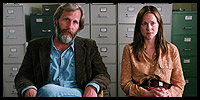 Autobiographically based on his own childhood experiences, writer-director Noah Baumbach's "The Squid and the Whale" centers on well-covered terrain—that of a family going through divorce—but never appears derivative. Maybe the key is that much of the plot, including the characters, is built from actual occurrences and people, rather than from contrived concoctions of a screenwriter's mind. The four characters who make up the suddenly-broken family unit are true originals, and the drama that parents Bernard (Jeff Daniels) and Joan (Laura Linney) face as they try to come to terms with their failed marriage at a time when their confused and angry sons, 16-year-old Walt (Jesse Eisenberg) and 12-year-old Frank (Owen Kline), need them most cuts deeply with the harsh, messy realities of real life. Amid the bleakness, and often because of it, there are some big laughs that arise naturally from their own flawed and quirky human natures. It's the type of material that doesn't feel written so much as lived, making the film as a whole all the more urgent and affecting because of it.
Autobiographically based on his own childhood experiences, writer-director Noah Baumbach's "The Squid and the Whale" centers on well-covered terrain—that of a family going through divorce—but never appears derivative. Maybe the key is that much of the plot, including the characters, is built from actual occurrences and people, rather than from contrived concoctions of a screenwriter's mind. The four characters who make up the suddenly-broken family unit are true originals, and the drama that parents Bernard (Jeff Daniels) and Joan (Laura Linney) face as they try to come to terms with their failed marriage at a time when their confused and angry sons, 16-year-old Walt (Jesse Eisenberg) and 12-year-old Frank (Owen Kline), need them most cuts deeply with the harsh, messy realities of real life. Amid the bleakness, and often because of it, there are some big laughs that arise naturally from their own flawed and quirky human natures. It's the type of material that doesn't feel written so much as lived, making the film as a whole all the more urgent and affecting because of it.
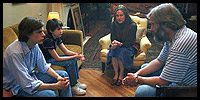 Faced with dividing their time between parents in a joint custody plan when Bernard moves to a different neighborhood on the outskirts of Brooklyn, Walt and Frank find themselves choosing sides. Bernard, an egotistical, misogynistic human being who has adapted these traits to mask his own failures and mistakes as a novelist and father, begins to rub off on Walt. In turn, Walt resents his mother for having an affair and doesn't hold back as he alienates new girlfriend Sophie (Halley Feiffer) by marginalizing her opinions and even picking apart such physical features as her freckles. Frank, meanwhile, prefers his mother's company, even more so when she begins dating his tennis instructor, Ivan (William Baldwin)—a man he idolizes. At the height of puberty, Frank takes out his familial stresses in both usual and bizarre ways, drinking heavily and wiping his own semen on library books and lockers at his school. As for Bernard, he refuses to believe he did anything wrong in the marriage and makes an attempt at winning over his children by playing the role of the victim. As he grows more and more frustrated when his latest novel is declined at one publishing company after the next, he becomes jealous as when Joan's personal writing successes eclipses his own.
Faced with dividing their time between parents in a joint custody plan when Bernard moves to a different neighborhood on the outskirts of Brooklyn, Walt and Frank find themselves choosing sides. Bernard, an egotistical, misogynistic human being who has adapted these traits to mask his own failures and mistakes as a novelist and father, begins to rub off on Walt. In turn, Walt resents his mother for having an affair and doesn't hold back as he alienates new girlfriend Sophie (Halley Feiffer) by marginalizing her opinions and even picking apart such physical features as her freckles. Frank, meanwhile, prefers his mother's company, even more so when she begins dating his tennis instructor, Ivan (William Baldwin)—a man he idolizes. At the height of puberty, Frank takes out his familial stresses in both usual and bizarre ways, drinking heavily and wiping his own semen on library books and lockers at his school. As for Bernard, he refuses to believe he did anything wrong in the marriage and makes an attempt at winning over his children by playing the role of the victim. As he grows more and more frustrated when his latest novel is declined at one publishing company after the next, he becomes jealous as when Joan's personal writing successes eclipses his own.
 If anything in the synopsis of "The Squid and the Whale" sounds either old-hat or too showily offbeat for its own good, know that the way all of the elements—story, writing, chemistry, acting—come together is miraculous in its emotional authenticity. A touching, unsentimental slice-of-life comedy-drama that, at 80 minutes, passes by in no time, the film's only downfall is that there isn't more of it. Further development of the four main characters, or an increased concentration on any one of them, could have aided in presenting a fuller picture of what happens when a family deals with the fallout of a separation or divorce. Nonetheless, the details writer-director Noah Baumbach does peel away from his childhood memories and observations are fascinating in their pull from cliches and embrace of events that are more pure and honest and all the more painful.
If anything in the synopsis of "The Squid and the Whale" sounds either old-hat or too showily offbeat for its own good, know that the way all of the elements—story, writing, chemistry, acting—come together is miraculous in its emotional authenticity. A touching, unsentimental slice-of-life comedy-drama that, at 80 minutes, passes by in no time, the film's only downfall is that there isn't more of it. Further development of the four main characters, or an increased concentration on any one of them, could have aided in presenting a fuller picture of what happens when a family deals with the fallout of a separation or divorce. Nonetheless, the details writer-director Noah Baumbach does peel away from his childhood memories and observations are fascinating in their pull from cliches and embrace of events that are more pure and honest and all the more painful.
 Appearing to want to make up for lost time with his kids after being gone a lot when they were younger, Bernard's obvious ulterior motives are two-fold: he doesn't want to be alone, and he will say whatever necessary to paint Joan as the bad guy. He loves Walt and Frank, certainly, but he is insufferable to endure and clueless to what goes on around him. Likening himself to the great writers of the world while criticizing their works as "minor," Bernard also has trouble being attentive as a father, going so far as buying Frank an old wooden desk to do his homework on. The problem is it's a left-handed desk, and Frank is right-handed—a detail he might have known had he been able to stop putting his own needs before his family's. Bernard also cheapens Frank's dreams of being a pro tennis player, believing it to be not serious enough as a profession. His reaction to Frank's claims that he is a "philistine"—Bernard's worst nightmare—is priceless. The dynamic as the youngest family member wavers toward his mother while the teenager emulates his father's personality without considering early on the far more loving relationship he once had with Joan rings with truth, signifying how time changes things, but cannot erase the past.
Appearing to want to make up for lost time with his kids after being gone a lot when they were younger, Bernard's obvious ulterior motives are two-fold: he doesn't want to be alone, and he will say whatever necessary to paint Joan as the bad guy. He loves Walt and Frank, certainly, but he is insufferable to endure and clueless to what goes on around him. Likening himself to the great writers of the world while criticizing their works as "minor," Bernard also has trouble being attentive as a father, going so far as buying Frank an old wooden desk to do his homework on. The problem is it's a left-handed desk, and Frank is right-handed—a detail he might have known had he been able to stop putting his own needs before his family's. Bernard also cheapens Frank's dreams of being a pro tennis player, believing it to be not serious enough as a profession. His reaction to Frank's claims that he is a "philistine"—Bernard's worst nightmare—is priceless. The dynamic as the youngest family member wavers toward his mother while the teenager emulates his father's personality without considering early on the far more loving relationship he once had with Joan rings with truth, signifying how time changes things, but cannot erase the past.
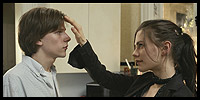 Performances are exemplary across the board, with Jeff Daniels (2005's "Good Night, and Good Luck") possibly delivering the performance of his career as the patriarch of the Berkman clan. Bernard isn't a bad man, but he is hard to endure and so full of himself that he requires a blast of hard reality. Even then, there is the big chance that he still wouldn't be able to look at himself from the outside and see how impossible he has become. His immediate brush-off of any work of art he believes to not be life-changing or groundbreaking is uncanny to some of the film critic colleagues I overhear at press screenings each week. These people do, indeed, exist, even if Bernard is an extreme case. As mother Joan, Laura Linney (2005's "The Exorcism of Emily Rose") is onscreen the least of the quartet, but makes her presence known with a powerful, at times shattering turn as a caring woman who can do nothing but watch as Walt slips away from her.
Performances are exemplary across the board, with Jeff Daniels (2005's "Good Night, and Good Luck") possibly delivering the performance of his career as the patriarch of the Berkman clan. Bernard isn't a bad man, but he is hard to endure and so full of himself that he requires a blast of hard reality. Even then, there is the big chance that he still wouldn't be able to look at himself from the outside and see how impossible he has become. His immediate brush-off of any work of art he believes to not be life-changing or groundbreaking is uncanny to some of the film critic colleagues I overhear at press screenings each week. These people do, indeed, exist, even if Bernard is an extreme case. As mother Joan, Laura Linney (2005's "The Exorcism of Emily Rose") is onscreen the least of the quartet, but makes her presence known with a powerful, at times shattering turn as a caring woman who can do nothing but watch as Walt slips away from her.
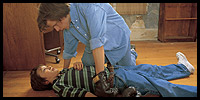 The younger actors hold their own with their elders, with Jesse Eisenberg (2005's "Cursed") superbly playing a young man whose teen angst has been overshadowed by teen superiority. Refusing to settle for less than perfection, Walt doesn't believe the lovely Sophie is anything more than "cute"—this is a debit for him—and so turns his sights on 20-year-old Lili (a winning, if shortchanged, Anna Paquin), a college student of Bernard's who has recently begun renting a room in his house. And as Frank, Owen Kline (2001's "The Anniversary Party") is a revelation, bravely handling some decidedly very mature material and coming off as not for one second stilted or affected. If they can bear to see their little boy cursing like a sailor, drinking up a storm, and masturbating like a fanatic, parents Kevin Kline and Phoebe Cates have a lot to be proud of.
The younger actors hold their own with their elders, with Jesse Eisenberg (2005's "Cursed") superbly playing a young man whose teen angst has been overshadowed by teen superiority. Refusing to settle for less than perfection, Walt doesn't believe the lovely Sophie is anything more than "cute"—this is a debit for him—and so turns his sights on 20-year-old Lili (a winning, if shortchanged, Anna Paquin), a college student of Bernard's who has recently begun renting a room in his house. And as Frank, Owen Kline (2001's "The Anniversary Party") is a revelation, bravely handling some decidedly very mature material and coming off as not for one second stilted or affected. If they can bear to see their little boy cursing like a sailor, drinking up a storm, and masturbating like a fanatic, parents Kevin Kline and Phoebe Cates have a lot to be proud of.
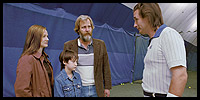 "The Squid and the Whale," which dabbles in similar topics as the very good recent Nicolas Cage-starrer, "The Weather Man," is uncompromising, captivating, and entertaining in a vastly uncomfortable way. An example of how independent cinema can be so much braver and more thematically substantial than studio pictures where a million and one behind-the-scenes people and Hollywood executives each have individual opinions on how things should be done to please the masses, Baumbach's work holds an immediacy and dimension that only someone could make who has already gone first-hand through the experiences depicted. As such, "The Squid and the Whale" doesn't wrap itself up and neatly solve its characters' issues by the end—that would be too easy and dishonest to what has come before—but finds an open-ended conclusion satisfying all the same. The final shot, a study in perceptive simplicity, is filled with both melancholy and hope, leaving the characters on a note that suggests, in time, they will be all right.
"The Squid and the Whale," which dabbles in similar topics as the very good recent Nicolas Cage-starrer, "The Weather Man," is uncompromising, captivating, and entertaining in a vastly uncomfortable way. An example of how independent cinema can be so much braver and more thematically substantial than studio pictures where a million and one behind-the-scenes people and Hollywood executives each have individual opinions on how things should be done to please the masses, Baumbach's work holds an immediacy and dimension that only someone could make who has already gone first-hand through the experiences depicted. As such, "The Squid and the Whale" doesn't wrap itself up and neatly solve its characters' issues by the end—that would be too easy and dishonest to what has come before—but finds an open-ended conclusion satisfying all the same. The final shot, a study in perceptive simplicity, is filled with both melancholy and hope, leaving the characters on a note that suggests, in time, they will be all right.
|
© 2008 by Dustin Putman |














